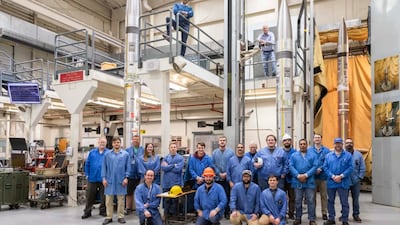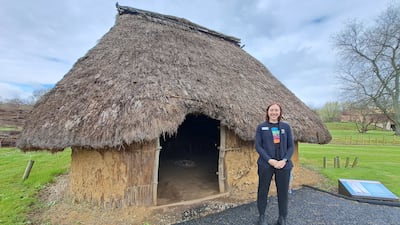Millions of people in the US looked to the skies on Monday in the hope of seeing the total solar eclipse.
While not visible across the entire country, people in 15 US states were able to view the phenomenon, which first became visible from Mexico's Pacific coast.
In the city of Pittsburgh, Pennsylvania, where residents could witness a near total solar eclipse, the spectacle was the talk of the town.
News outlets were focused on the weather, with regular bulletins – and to the disappointment of many, the forecast was cloudy.
At Salem’s Market and Grill in the city’s historic Hill District, advertisements taped to a wall near the entrance touted events around the eclipse.
Abdullah Salem, owner of the grocery shop, said his children’s school closed for the event.
“I won’t be watching it, though – I work seven days a week,” he told The National.
Hundreds of people descended on the hills of Pittsburgh’s Riverview Park before the skies the north-eastern US began to darken.
The Pittsburgh Parks Conservancy ran out of glasses to give to people, but said many came with their own and shared with one another.
Matthew Leman, director of operations and visitor engagement for the Pittsburgh Parks Conservancy, said Riverview Park welcomed up to 500 people to view the eclipse.
“People have come from all over,” he said. "[What] we're here to do is to get people back outside again, back out and experiencing the parks.”
People of all ages looked to the sky and took photos, despite the cloudy weather.
It was an upbeat atmosphere, with music blaring from a solar-powered music system set up by Jerome Jones II of Zero Fossil, which offers event services powered by solar energy.
“Here in Pittsburgh, we're only at 98 per cent [totality], so we still get sun and solar power – so we're good,” he told The National.
Other residents were hoping for a break in the clouds when they gathered at eclipse parties across the city, including at Pittsburgh’s Allegheny Observatory and Carnegie Science Centre.
At the University of Pittsburgh in the city’s Oakland area, eclipse viewing glasses were handed out to students and staff.
Alexandra Weiner, who teaches mathematics, said she knew a lot of people who travelled north to Ohio to watch the total eclipse.
“I might go to Mount Washington later to watch it happen over Pittsburgh.”

The National spoke with Yao and Bernard, who were selling solar eclipse glasses at Schenley Plaza – and they said business was “awesome”.
“The weather is not perfect,” said Yao, but she expressed excitement at being part of something that won't happen again for many years.
More than 30 million people live in the path of the total eclipse, with millions more who travelled to cities such as Pittsburgh as well as Austin, Texas, and Indianapolis, Indiana, to witness the spectacular cosmic event.
Cities across Mexico, the US and Canada host more than 110,000 active short-term rental listings on the eclipse’s path.
Searches on Airbnb for stays along the route surged 1,000 per cent ahead of the event, the company said.
Airbnb added that almost 90 per cent of its listings have been booked.
Jefferson, Vermont, is the town with the highest occupancy rate, at 99.2 per cent, for its 512 short-term listings.
The eclipse is expected to generate $6 billion in economic impact, including $1.6 billion in spending by visitors, according to The Perryman Group consultancy.
The economic benefit in Texas, where 12 million residents live on the eclipse’s path, will reach nearly $1.4 billion.
Kyle Fitzgerald contributed to this report from Washington













































